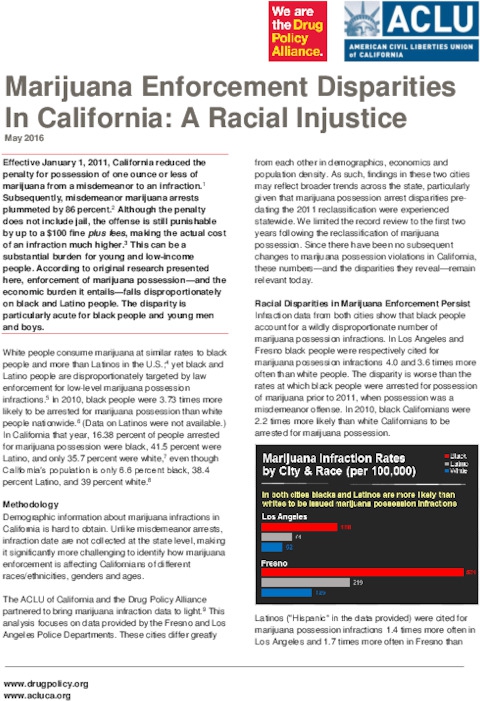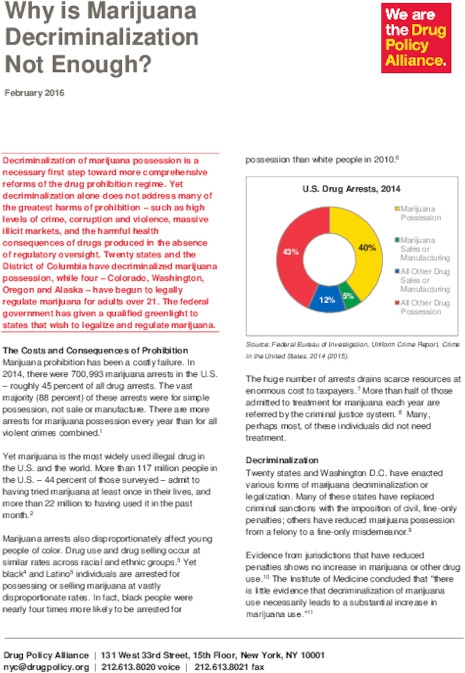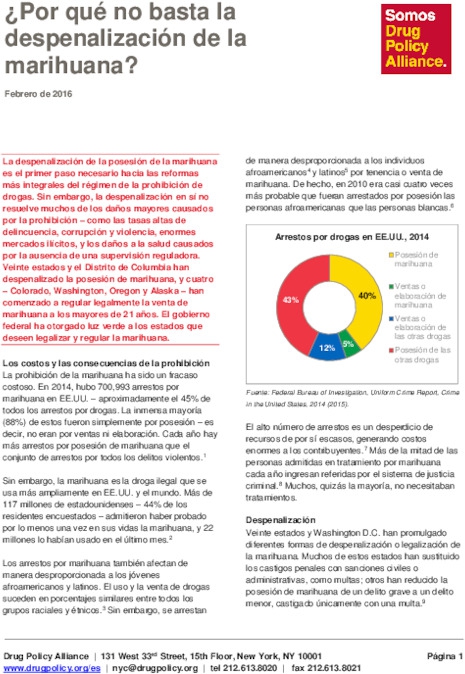From the Open-Publishing Calendar
From the Open-Publishing Newswire
Indybay Feature
California: Marijuana Infractions Unfairly Enforced Against People of Color
Oakland, May 31, 2016 – New data analyses conducted by the Drug Policy Alliance and ACLU of California (see PDF) find that racial disparities in marijuana policing have persisted, following the reduction of low-level marijuana possession from a misdemeanor to an infraction in 2011. Possession of under an ounce of marijuana is punishable in California by a base fine up to $100 (plus substantial fees).

Despite marijuana usage rates being similar across racial and ethnic lines, data provided by the Los Angeles and Fresno Police Departments show that black and Latino people in those cities were issued marijuana possession citations at higher rates than white people in the years immediately following the penalty change from misdemeanor to infraction. The data also reveal that marijuana possession enforcement falls mostly on young people. In both cities, the majority of infractions were issued to persons 29 years of age and younger.
In both cities black people are issued marijuana possession infractions at nearly 4 times the rate of white people and Latinos are cited at nearly 1.5 times the rate of white people. In Los Angeles, approximately 1 in 532 black people are cited for a marijuana possession infraction as compared to 1 in 1,351 Latinos and 1 in 1,923 white people. The numbers are even more stark in Fresno, where approximately 1 out of every 200 black people are issued marijuana infractions as compared to 1 in 457 Latinos and 1 in 800 white people.
“Racial disparities in marijuana enforcement are widespread and longstanding. Los Angeles and Fresno are very different places; yet they reveal similar disparities. It’s likely that young black and Latino Californians experience these disparities statewide,” said Margaret Dooley-Sammuli, Criminal Justice and Drug Policy director for the ACLU of California. “A $100 citation can easily become several times that, after all the fees are added. This presents a significant burden for young people and low-income families.”
“It is disappointing to see that even at the level of infractions, California law enforcement are incapable of applying the law equally across racial lines,” said Alice Huffman, president of the CA-Hawaii NAACP. “I am hopeful that full legalization as proposed in the Adult Use of Marijuana Act will drastically reduce the numbers of young people of color being funneled into the criminal justice system for minor drug offenses.”
In November 2016, Californians will have the chance to vote for the Adult Use of Marijuana Act (AUMA). Voting for the AUMA will not only regulate the marijuana industry in the state but will also remove marijuana possession penalties both prospectively and retroactively for adults. For youth, these penalties will be replaced with drug treatment and education in an effort to reduce the harms associated with criminal justice involvement at an early age.
“While many may believe that marijuana is already legal in California, these data show that young adults of color continue to experience hugely disproportionate enforcement,” said Amanda Reiman, manager of Marijuana Law and Policy for the Drug Policy Alliance. “The only way to begin to unravel this legacy of disparate enforcement is to move marijuana into a fully regulated market at the statewide level.”
Learn more
Fact Sheet: Why Marijuana Decriminalization Isn't Enough
http://www.drugpolicy.org/resource/why-marijuana-decriminalization-not-enough
https://www.aclunc.org/news/california-marijuana-infractions-unfairly-enforced-against-people-color
ACLU of Northern California
https://www.aclunc.org/
In both cities black people are issued marijuana possession infractions at nearly 4 times the rate of white people and Latinos are cited at nearly 1.5 times the rate of white people. In Los Angeles, approximately 1 in 532 black people are cited for a marijuana possession infraction as compared to 1 in 1,351 Latinos and 1 in 1,923 white people. The numbers are even more stark in Fresno, where approximately 1 out of every 200 black people are issued marijuana infractions as compared to 1 in 457 Latinos and 1 in 800 white people.
“Racial disparities in marijuana enforcement are widespread and longstanding. Los Angeles and Fresno are very different places; yet they reveal similar disparities. It’s likely that young black and Latino Californians experience these disparities statewide,” said Margaret Dooley-Sammuli, Criminal Justice and Drug Policy director for the ACLU of California. “A $100 citation can easily become several times that, after all the fees are added. This presents a significant burden for young people and low-income families.”
“It is disappointing to see that even at the level of infractions, California law enforcement are incapable of applying the law equally across racial lines,” said Alice Huffman, president of the CA-Hawaii NAACP. “I am hopeful that full legalization as proposed in the Adult Use of Marijuana Act will drastically reduce the numbers of young people of color being funneled into the criminal justice system for minor drug offenses.”
In November 2016, Californians will have the chance to vote for the Adult Use of Marijuana Act (AUMA). Voting for the AUMA will not only regulate the marijuana industry in the state but will also remove marijuana possession penalties both prospectively and retroactively for adults. For youth, these penalties will be replaced with drug treatment and education in an effort to reduce the harms associated with criminal justice involvement at an early age.
“While many may believe that marijuana is already legal in California, these data show that young adults of color continue to experience hugely disproportionate enforcement,” said Amanda Reiman, manager of Marijuana Law and Policy for the Drug Policy Alliance. “The only way to begin to unravel this legacy of disparate enforcement is to move marijuana into a fully regulated market at the statewide level.”
Learn more
Fact Sheet: Why Marijuana Decriminalization Isn't Enough
http://www.drugpolicy.org/resource/why-marijuana-decriminalization-not-enough
https://www.aclunc.org/news/california-marijuana-infractions-unfairly-enforced-against-people-color
ACLU of Northern California
https://www.aclunc.org/
Add Your Comments
We are 100% volunteer and depend on your participation to sustain our efforts!
Get Involved
If you'd like to help with maintaining or developing the website, contact us.
Publish
Publish your stories and upcoming events on Indybay.
Topics
More
Search Indybay's Archives
Advanced Search
►
▼
IMC Network






